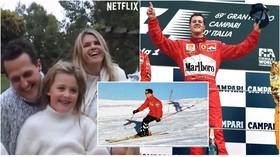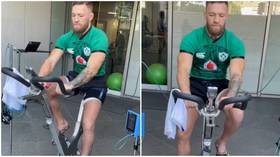Schumacher on Netflix: Insights into a fiercely guarded racer – but unanswered questions on recovery of stricken icon

The new Netflix documentary about Michael Schumacher seeks to lift the veil on the infamously private Formula One star, so why then does it feel like a carefully manicured piece which ultimately leaves more questions than answers?
The status surrounding the health of the seven-time world champion has remained one of the most closely guarded secrets in sports since the 2013 near-fatal skiing accident in the French Alps which extinguished the German's role in public life and prompted his family to retreat – quite understandably – from the watchful glare of the world's media.
Since then, almost nothing has filtered out. Occasional rumors traverse the sports pages, such as those from a year ago which suggested that Schumacher's family were seeking stem cell therapy in a bid to improve his health (these have since been flatly denied), or the occasional tersely-worded updates from former Ferrari boss Jean Todt which told us that "Michael is fighting" and little else.
But when it comes down to brass tacks, the Schumacher family's pursuit of privacy is ultimately at odds with the very concept of a documentary and as such, it leaves the viewer with a solemn, rich history of his life in the fast lane but pulls its punches when it comes to any substantive disclosure of the past eight years of his life.
Schumacher was, and continues to be, a fiercely private man. Showcasing archived footage from his youth spent on the go-karting circuit, the documentary paints a picture of a supremely talented driver whose ultimate graduation to Formula One seemed inevitable. But when he arrived at the sport's grandest stage where he was flanked by battle-worn drivers like Ayrton Senna, Alain Prost and Nigel Mansell, Schumacher expressed a desire to sidestep the limelight throughout his first seats with the Jordan and Benetton teams.
Schumacher's talent, however, didn't allow for this type of humility, particularly in the early years of the 1990s in what many F1 fans still see as among the sport's golden eras. Senna, who would ultimately become the source of his own grim documentary some years later, is portrayed as a something of a puppet-master, particularly in early footage which shows him chewing the ear off of Schumacher soon after a particularly tense encounter on the racetrack.
The German, though, was no marionette and eased into the type of professional rivalry Senna was apparently eager to create – something that the documentary states was a defense mechanism launched by the Brazilian when it seemed that this young German driver had arrived to succeed him.
As fate would have it, Schumacher ultimately won the fateful Grand Prix during which Senna lost his life in San Marino in 1994. It was as blunt a 'changing of the guard' as one can expect to see in professional sports, and something which affected Schumacher greatly. Footage is shown of a smiling Schumacher after his win and contrasted with a visible existential malaise of the risks inherent in the sport he loved when informed of Senna's condition soon after.
For months afterwards, Schumacher says he was unable to rid himself of the thoughts of his own potential fiery demise on the track.
OUT NOW.Worldwide, in more than 190 countries, in 30 different languages.Only on NetflixSCHUMACHER🏎 #SchumacherNetflix 🏎AB HEUTE:Weltweit, in mehr als 190 Ländern, in 30 verschiedenen Sprachen.Exklusiv auf Netflix SCHUMACHER pic.twitter.com/QpT1dcdNrC
— Michael Schumacher (@schumacher) September 15, 2021
Schumacher's lust for success is plainly shown, and neatly summed up into two aspects of his character. The first is the exhaustive attention to detail which saw him spend countless hours with Ferrari mechanics as they attempted to coax a world championship performance from a machine that was anything but well-oiled – but the other portrays an element of Schumacher which has been forgotten by some; his win-at-all-costs approach.
It was aspect of his persona which sometimes betrayed his better instincts. There was the infamous shunt with rival David Coulthard which the documentary had trouble explaining who was actually at fault (Coulthard, interviewed in the documentary, maintains it was Schumacher's error) or the split second decision to sideswipe Mika Hakkinen. There was also a similar incident involving Schumacher and Damon Hill.
Some of these incidents cast a negative pall over Schumacher at the time, painting him as a vengeful driver and as someone who could not admit error unless confronted with incontrovertible evidence to the contrary – a point which is quickly glossed over in the near two-hour long film.
After spending the best part of an hour and forty-five minutes celebrating Schumacher's legendary career, his world championships, his renaissance with Mercedes in 2010, the documentary eventually finds itself in the topic which the more voyeuristic elements of his fanbase are yearning for – but after painstakingly celebrating every element of Schumacher's life and career, the film's curiosity largely stops after 2013.
Promotional material for the documentary had, it turns out, said all we were going to hear about Schumacher's condition for the past eight years with very little saved for the film itself. His wife, Corinna, admits that "Michael is here – different, but here" while son Mick – who is in his first season as a Formula One driver himself – admits that he would give everything up for a chance to talk shop with his father once again.
Also on rt.com ‘Michael is here – different, but here’: Schumacher’s wife gives rare update on F1 icon eight years after near-fatal brain injuryThese admissions are as close as we get to any forthright statement about Michael Schumacher – and, to be clear, that is his family's absolute right.
He will, it seems, remain sequestered in his family's bosom indefinitely. It is a sad and incongruous conclusion to a life lived at 200mph, but a tell-all piece about Schumacher's ill health would betray the manner in which we became to know him: that of a man famous for driving fast, taking risks and sidestepping media attention.
'Schumacher' is a worthwhile monument to the man that bears its name; a portrait of an artist as a young man and nothing more. His latter life remains under lock and key, and anyone seeking more will find it to be a fruitless search.
And this it seems is non-negotiable. Michael Schumacher's life is to be remembered for its heyday and everything else is a strictly private – a noble sentiment to be sure, even if it is at odds with the very concept of documentary filmmaking.
By John Balfe
The statements, views and opinions expressed in this column are solely those of the author and do not necessarily represent those of RT.














